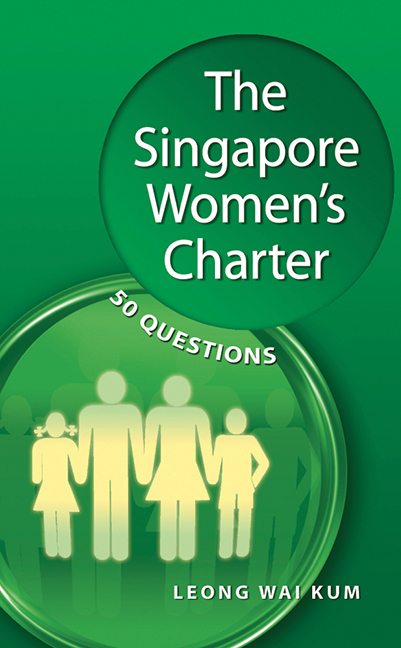Book contents
- Frontmatter
- Contents
- List of Questions
- Foreword
- Preface
- Part I What is the Women's Charter?
- Part II Marriage
- Part III Regulation of Husband-Wife Relationship
- Part IV Regulation of Parent-Child Relationship
- Part V Violence in the Family
- Part VI Divorce and the Process
- Part VII Maintenance
- Part VIII Division of Matrimonial Assets
- Part IX Muslims
- Epilogue
- References
- Index
- About the Author
- Frontmatter
- Contents
- List of Questions
- Foreword
- Preface
- Part I What is the Women's Charter?
- Part II Marriage
- Part III Regulation of Husband-Wife Relationship
- Part IV Regulation of Parent-Child Relationship
- Part V Violence in the Family
- Part VI Divorce and the Process
- Part VII Maintenance
- Part VIII Division of Matrimonial Assets
- Part IX Muslims
- Epilogue
- References
- Index
- About the Author
Summary
To what extent does the Women's Charter apply to Muslim Singaporeans?
General statute
Only from a layman's point of view is the Women's Charter a non-Muslim family statute. It is in fact one among the general statutes of the Republic of Singapore. Section 3(1) provides that the Women's Charter applies to all persons in Singapore. The only qualification comes within section 3(2) which provides that some parts of it do not apply to persons who are married under Muslim law. Those exclusions from application, however, still leave many parts of the Women's Charter applicable even to persons who are married under Muslim law.
Formation of a non-Muslim marriage
The part of the Women's Charter regulating the formation of non-Muslim marriage (discussed in Part II above) are clearly not applicable to persons who are married under Muslim law. These provisions were enacted to replace the separate marriage laws that existed previously which applied only to non-Muslim Singaporeans according to the ethnic group they belong to or their religious affiliation.
Termination of a non-Muslim marriage
The parts of the Women's Charter on termination of a non- Muslim marriage by divorce (discussed in Part VI above) are also not applicable to persons married under Muslim law.
Regulation of spouses in a non-Muslim marriage
The parts of the Women's Charter regulating a husbandwife relationship within a non-Muslim marriage (discussed in Part III above) are also not applicable to persons married under Muslim law.
Protection from violence within the family
The parts of the Women's Charter on protection from violence within the family (discussed in Part V above) do apply to all Singaporeans whether married or unmarried and, if married, whether under non-Muslim or Muslim law. The infliction or threat of violence is unacceptable whatever the religion of the parties and, if married, whether under non-Muslim or Muslim law.
Regulation of the relationship between parent and child
The parts of the Women's Charter regulating the relationship between parents and their child (discussed in Part IV above) do apply to all Singaporeans, irrespective of whether the parents are non-Muslim or Muslim, and, if the parents are married, whether under non-Muslim law or Muslim law. While the particular religion of the parents may be a factor for consideration by a court when reviewing an application before it, the law does not change according to the parents’ religion.
- Type
- Chapter
- Information
- The Singapore Women's Charter50 Questions, pp. 121 - 128Publisher: ISEAS–Yusof Ishak InstitutePrint publication year: 2011

